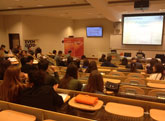
 Podgorica, 10 April 2014
Podgorica, 10 April 2014
Around 90 law students gathered today at two Montenegrin universities to listen to lectures given by Ljiljana Hellman, a court officer in the ICTY's Registry.
At the University of Donja Gorica the main topic of discussion was the transfer of cases from the ICTY to local courts. Many students were interested to know how this process was handled, how many cases were transferred and if more would be handed over in future. One student asked: “How exactly is it decided which cases can be transferred?” Ljiljana explained that one of the things that was important in this process was the level of power the accused had held, and that the ICTY had decided to transfer lower- or middle-ranking officers/officials, with the highest ranking indictees remaining for trial in The Hague.
At the Mediteran Law Faculty, after Ljiljana’s lecture the students engaged in a discussion about sexual violence in conflict, as well as whether and how it can be considered as an act of genocide. Ljiljana gave an overview of the development of legal practice before the ICTY regarding sexual violence, mentioning some early judgements that firmly established that sexual violence is not just a by-product of war but can also constitute a war crime. Discussion turned to the establishment of the ICTY by the United Nations Security Council, with students asking if other, similar tribunals had been established to prosecute crimes committed in other conflicts. Ljiljana explained that the ICTY was the first such international court, but that a number of other ad hoc tribunals followed, eventually leading to the establishment of the permanent International Criminal Court in The Hague.

